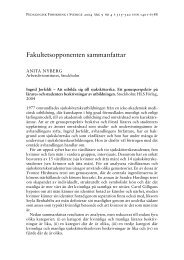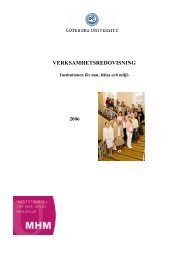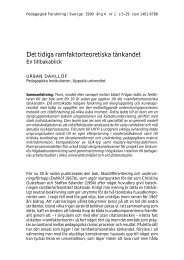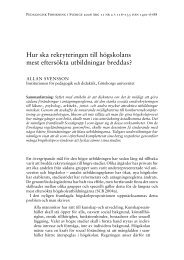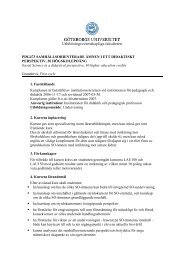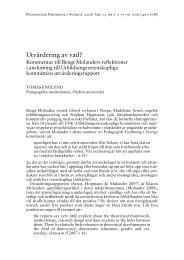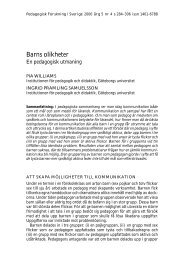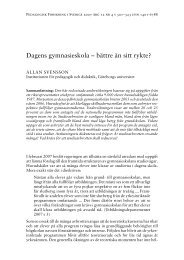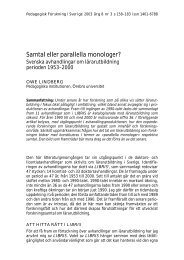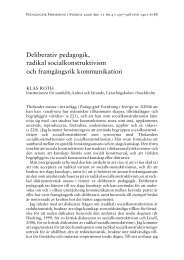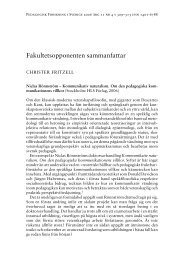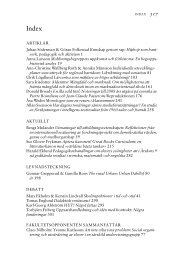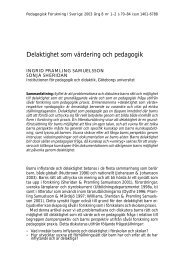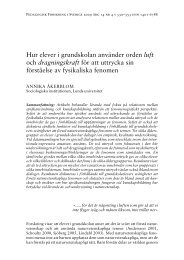University of Oslo Workshops June 29-30 Conference July 1-3 ...
University of Oslo Workshops June 29-30 Conference July 1-3 ...
University of Oslo Workshops June 29-30 Conference July 1-3 ...
Create successful ePaper yourself
Turn your PDF publications into a flip-book with our unique Google optimized e-Paper software.
eading and reading literacy achievement varied substantially with reading literacy<br />
achievement. However, for students with reading literacy achievement between 0.5 and 1<br />
standard deviation below the mean, and for those with reading literacy achievement just<br />
under 0.5 standard deviations above the mean, this correlation was lower than expected.<br />
This possibly indicates behavioral phenomena, test effects or a combination <strong>of</strong> both, and<br />
certainly indicates the need for further theoretical consideration and analytical work.<br />
Keywords: attitude to reading; reading literacy achievement; correlation curve<br />
<br />
Reading between the Lines: Contributing Factors that Affect Grade 5 Learner<br />
Reading Performance as Measured across South Africa’s 11 Languages.<br />
Surette van Staden, Center for Evalution and Assessment, <strong>University</strong> <strong>of</strong> Pretoria, South Africa<br />
Sarah Howie, Center for Evalution and Assessment, <strong>University</strong> <strong>of</strong> Pretoria, South Africa<br />
This paper reports on the results <strong>of</strong> a study which purpose was to identify and explain<br />
relationships between some major factors associated with successful reading at Grade 5<br />
level in South African primary schools. In South Africa, grave concerns with regards to<br />
low levels <strong>of</strong> student achievement pervade research initiatives and educational debates.<br />
Despite considerable investments in educational inputs (such as policy and resources) and<br />
processes (such as curriculum provision and teacher support), outcomes (such as student<br />
achievement) remain disappointingly low. The South African population is characterized<br />
by great diversity and variation. With 11 <strong>of</strong>ficial languages, current educational policy in<br />
South Africa advocates an additive bilingualism model and students in Grade 1 to 3 are<br />
taught in their mother tongue. Thereafter, when these students progress to Grade 4, the<br />
language <strong>of</strong> learning and teaching changes to a second language, which in most cases is<br />
English. At this key developmental stage students are also expected to advance from<br />
learning to read to a stage where they can use reading in order to learn. With this<br />
complexity <strong>of</strong> issues in mind, Hierarchical Linear Modeling (HLM) was used to determine<br />
the effect <strong>of</strong> a number <strong>of</strong> explanatory variables at student- and school level on reading<br />
achievement as outcome variable, while controlling for language using the South African<br />
PIRLS 2006 data. Utilizing Creemers’ Comprehensive Model <strong>of</strong> Educational Effectiveness<br />
as theoretical point <strong>of</strong> departure, this paper will focus on the results <strong>of</strong> an overall South<br />
African model with student- and school level variables.<br />
Keywords: secondary analysis; educational policies; reading literacy; PIRLS 2006<br />
Academic Work Ethics and Student Outcomes: Findings in a Global<br />
Perspective<br />
Laurence Ogle, Center for Research in Mathematics and Science Education, San Diego State<br />
<strong>University</strong>, USA<br />
<br />
In The Protestant Ethic and the Spirit <strong>of</strong> Capitalism, Max Weber asked a central question:<br />
Why did capitalism develop first in Protestant rather than Catholic societies? He proposed<br />
that the Reformation uniquely joined a religious consciousness to a cultural ethos <strong>of</strong> hard<br />
work and achievement. This paper, drawing on data from PIRLS 2006 examines the<br />
59



